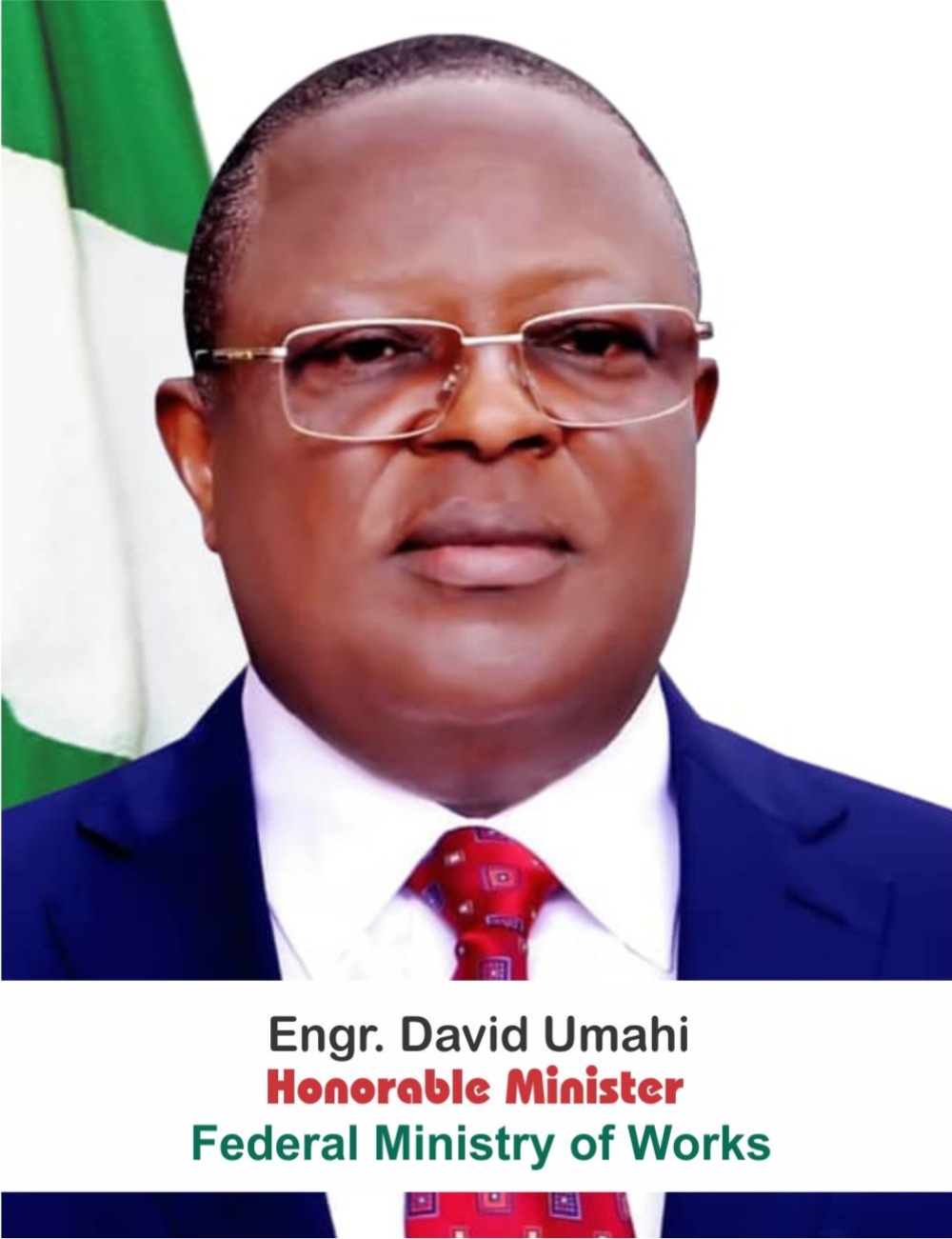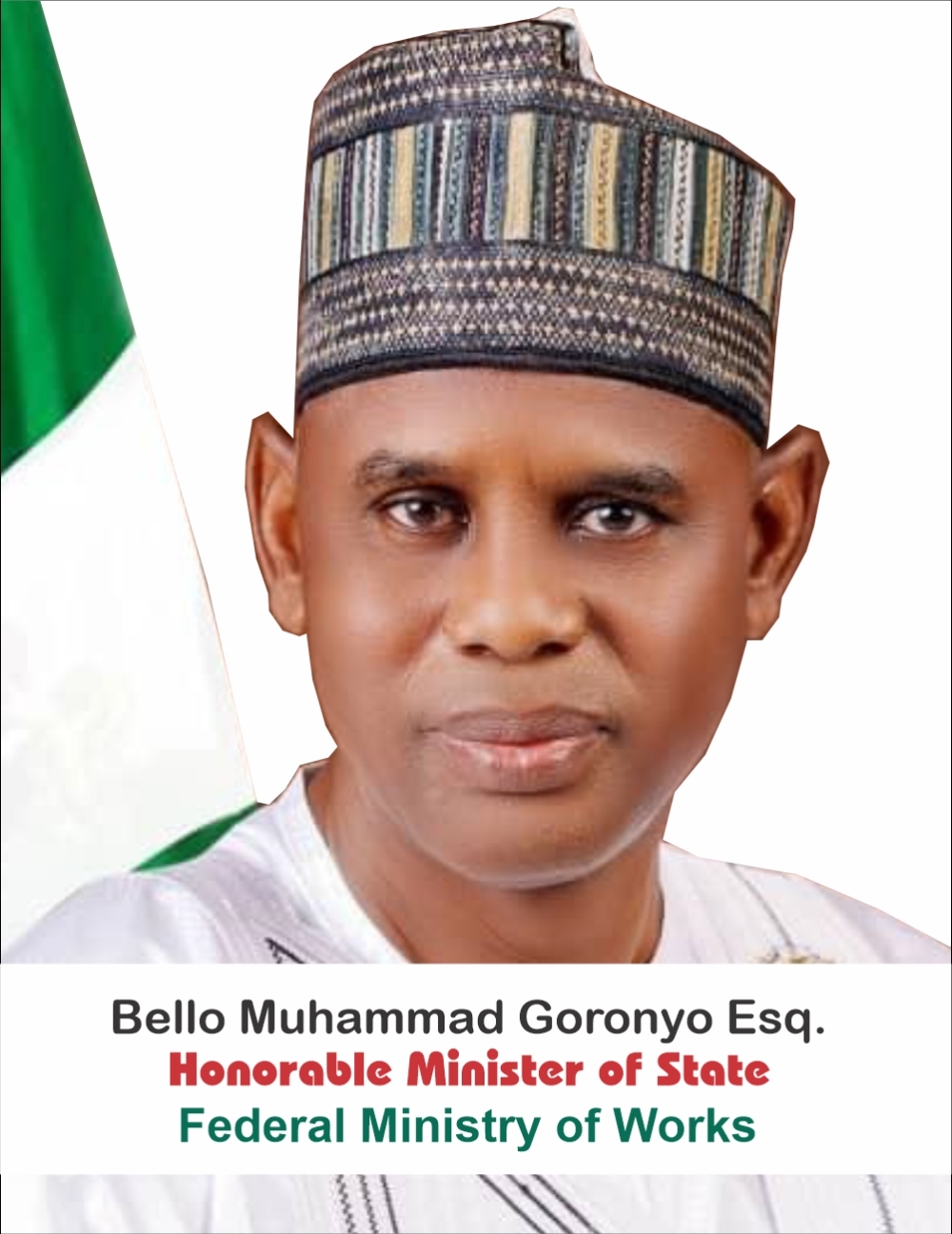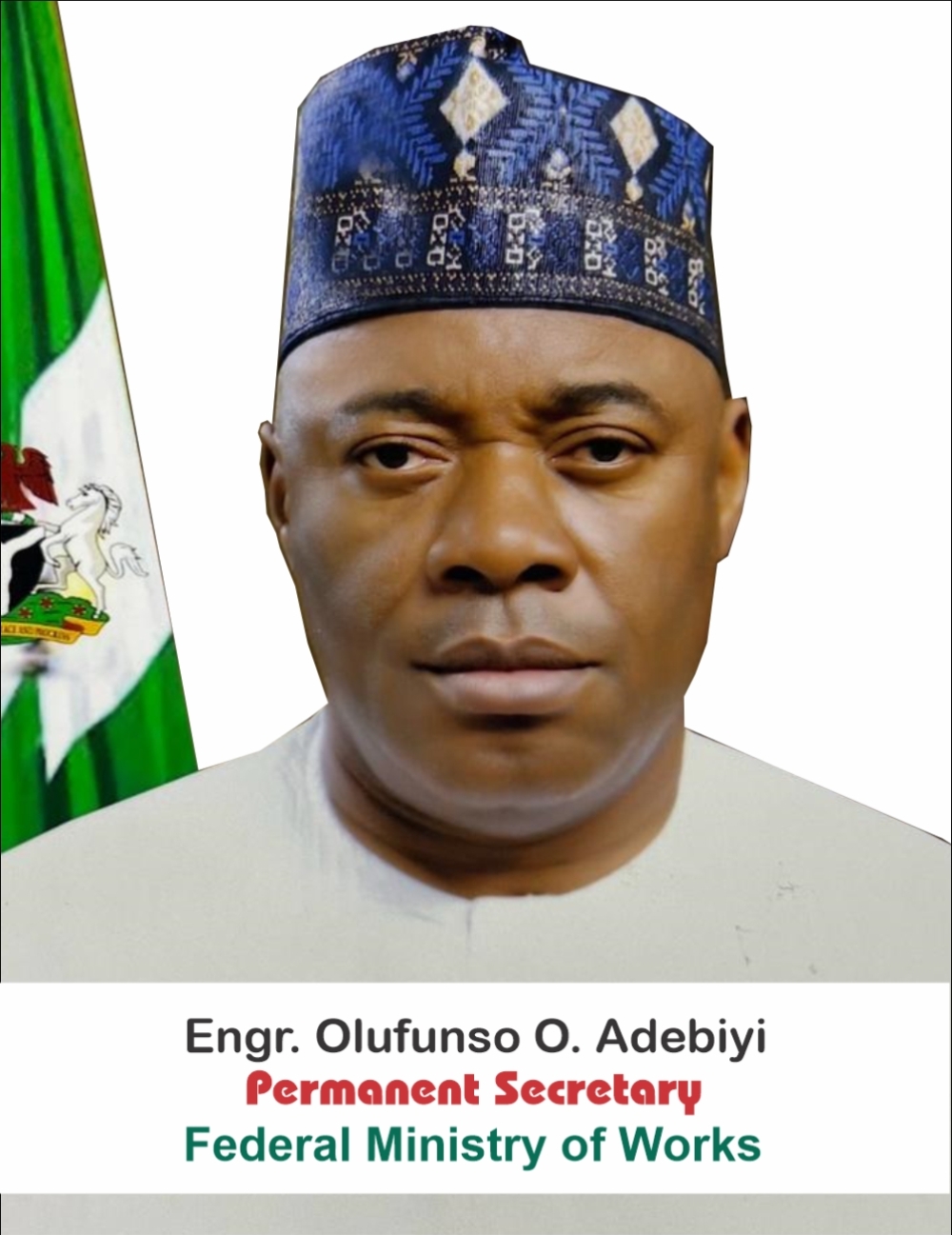
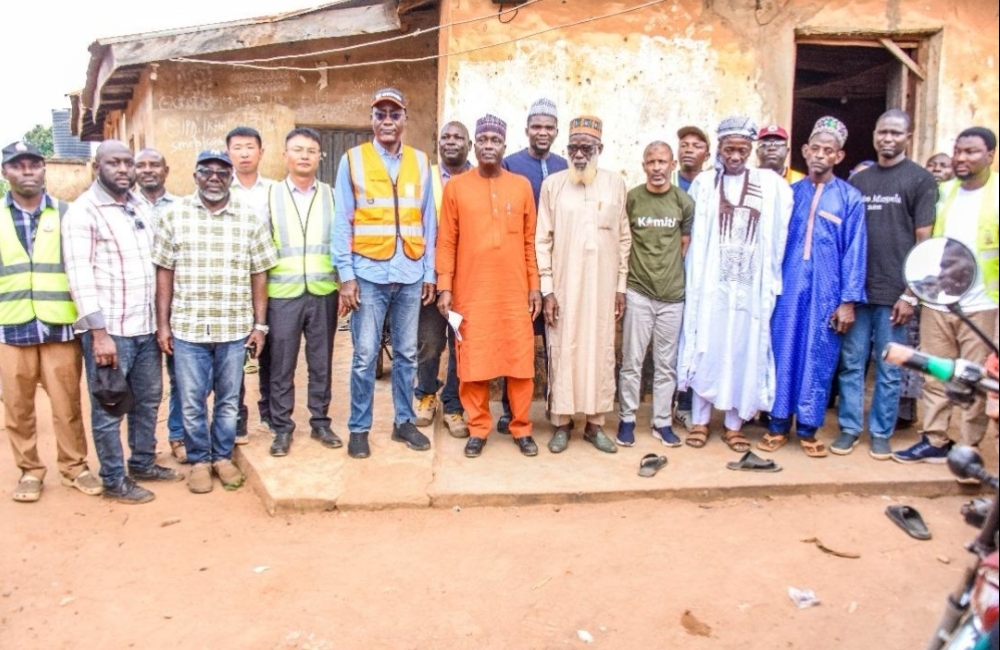
LATEST PRESS
The Federal Ministry of Works has extended its heartfelt condolences to the people of Essan Community in Katcha Local Government Area of Niger State following the tragic tanker explosion that claimed several lives and caused extensive damage in the area. The delegation, on behalf of the Honourable Minister of Works, Engr. David Umahi, CON, expressed deep sorrow over the unfortunate incident. The Director, Highways, North Central, delivered the Minister’s message. Salihu Kolapo Ahmed, during a visit to the community head, the Dekechi of Essan, Alhaji Muhammad Dauda Muhammad. Engr. Umahi commiserated with the bereaved families and the entire community, describing the incident as a painful and avoidable tragedy. He assured the people that the Federal Government remains committed to improving the condition of the road network in the country to prevent similar accidents in the future. > “The Federal Ministry of Works mourns with you at this difficult time. We pray for the peaceful repose of the departed souls and strength for the families they left behind,” Engr. Umahi conveyed through his representative. “This sad event underscores the urgent need to accelerate, especially, the ongoing Reconstruction of the Lambata-Lapai-Agaie-Bida Road in Niger State. We are fully committed to ensuring safer and more reliable road infrastructure to avert future occurrences of such tragedies.” Following the message, prayers were offered for the repose of the departed souls and divine comfort for the grieving families. Responding, the Dekechi of Essan, Alhaji Muhammad, expressed deep appreciation to the Honourable Minister for his compassion and prompt response. He lamented the poor condition of the road linking the area, describing it as a “death trap” that has continued to endanger the lives of road users. > “We thank the Honourable Minister for standing with us in our moment of grief. The bad state of the road has made movement extremely difficult and dangerous. We appeal to the Federal Government to give urgent attention to this route so that lives can be saved,” the community head said. He called on the management of the Federal Road Safety Corps (FRSC) to stop, forthwith, the overburdening of articulated vehicles with human beings, revealing that most of those who lost their lives in the inferno were such travelers not indigenes. The Ministry reaffirmed its resolve to prioritise the reconstruction of the road as part of ongoing efforts to enhance road safety, ease transportation challenges, and support economic development in the State and Nigeria, in general. “The Honourable Minister has directed that immediate assessments be carried out on the affected section with a view to implementing lasting engineering solutions that will improve safety and mobility,” Engr. Ahmed stressed. The visit underscores the Ministry’s human-centered approach under the leadership of Engr. David Umahi, CON, remains focused on building durable road infrastructure and responding promptly to the needs and concerns of Nigerian communities affected by road-related tragedies. Engr. Ahmed described the pace of work on the affected alignment as “too slow and unacceptable,” directing the contractor, Messrs CGC (Nig.) Ltd. to quickly deploy more resources and approach the work from more locations. “The contractor needs to mobilise more equipment to the site and let us have free movement of vehicles. Failure to do so, in the next few days, will attract decisive action,” he stated. The Project Manager, Mr. Fan Bo, assured that the company would mobilise more equipment within days to intensify work and ease the movement of people, goods, and services on the critically failed portions of the road. The Deputy Director, Construction at the Ministry of Works and Infrastructure Development, Niger State, Engr. Nasir Ahmed, disclosed that the Minister’s directive was aimed at ensuring free vehicular movement and reducing frequent accidents along the busy corridor. He urged motorists, especially truck drivers, to remain patient and cooperate with the contractors during the construction period. The 124.8-kilometre project, awarded several years ago, was phased into two sections by the current administration, with Phase 1 covering 92 kilometres from Lambata to Agaei, valued at N39 billion, remaining 10 kilometres to completion, and Phase 2, which covers the most critical section from Agaei to Bida, is soon to be awarded.
Ministry Officials Pay Condolence Visit to Essan Community Over Lives Lost in Tanker Explosion
~ Promise Accelerated Palliative Works
“This is a follow-up to the Niger State governor’s efforts. The Minister wants serious action so that there will be no more gridlocks or accidents on this road,” he added.
“Their impatience causes a lot of the nuisances we see. They should be patient and follow instructions so that work can progress smoothly,” he advised.
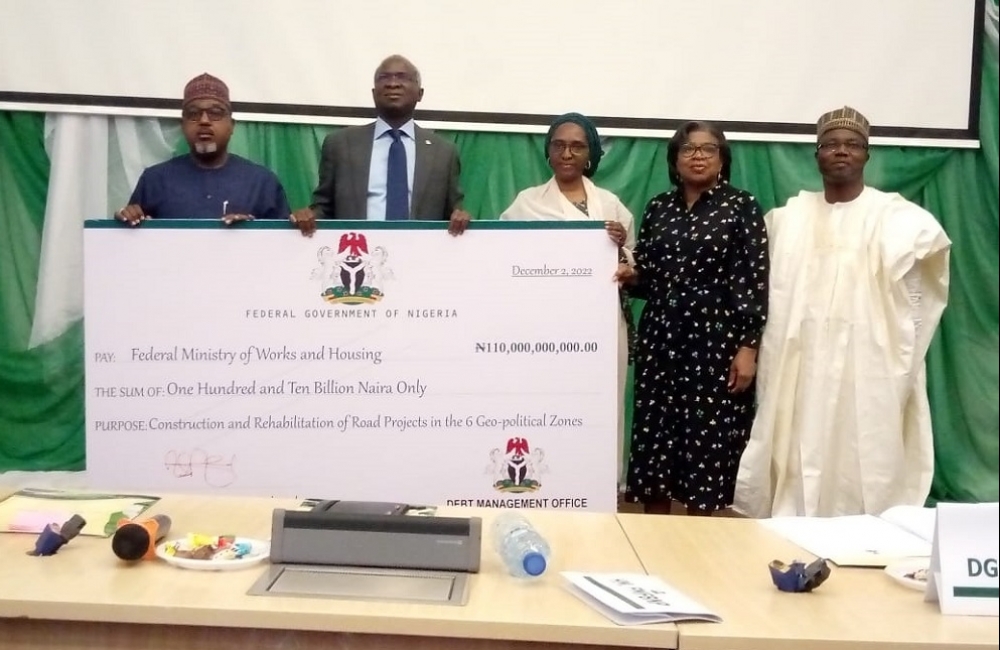
Works Ministry Gets N110b SUKUK Funding for Roads. The Federal Ministry of Works and Housing on Monday received a cheque of N110 billions of SUKUK funding for the execution of critical road projects across the six geo-political zones of the country. Two Ministries benefited from a total of N130 billion 2022 SUKUK Fund, these are: Federal Ministry of Works and Housing and the Federal Capital Territory. While the Federal Ministry of Works and Housing received N110 billion, the Ministry of the Federal Capital Territory received N20 billion. The SUKUK fund is a form of Public Private Partnership (PPP) which was among the funding options adopted by the Federal Government under President Muhammadu Buhari to fund the construction of critical roads in Nigeria. Receiving the cheque on behalf of the Ministry, the Minister of Works and Housing, Mr. Babatunde Fashola, SAN gave an account of the nature of the nation’s road before the introduction of the SUKUK funding. According to him, the total capital budget for road projects across the nation for Federal Ministry of Works and Housing in year 2015 was N18 billion. He said: “As of 2015 the Capital budget for Works was just N18 billion for all Nigerian roads at the time oil prices were just dropping shy of a hundred dollar per barrel and all that could be committed to Nigerian roads was just N18 billion.” Explaining the impact of the meager amount spent on Nigerian roads then, he said that construction companies were therefore laying off staff because the Federal Government was owning these companies. “That was the story before SUKUK,” he said. Fashola stated that this development could not fund the nation’s road projects adequately, adding that despite the fact that the Capital budget position of the Ministry was moved from N18 billion to over N260 billion in 2016, Federal Government had to look into alternative sources of funding road projects because that was not still enough. “That is where the SUKUK funding came in and through the SUKUK, we have completed several road and bridge projects across the six geo-political zones of the country,”. According to him, SUKUK financing has enhanced the completion of some of the priority road and bridge projects across the country. Earlier the host, Minister of Finance, Budget & National Planning, Dr. Zainab Shamsuna Ahmed while presenting the cheque to the two Ministries said that President Muhammadu Buhari was committed to the development of road infrastructure of the country. While listing the intervention of the Federal Government of Nigeria Sovereign SUKUK Fund in the Nation’s Road infrastructure, Dr. Ahmed disclosed that in 2017, the sum of N100 Billion was expended on the nation’s road infrastructure, N200 Billion in 2018, N362.56 Billion in 2020, N612.56 Billion in 2021, and N742.56 Billion in 2022 respectively. She said: “This symbolic event therefore is part of the celebration of the contribution of the Sovereign SUKUK Fund to road infrastructure development over the years.” ...
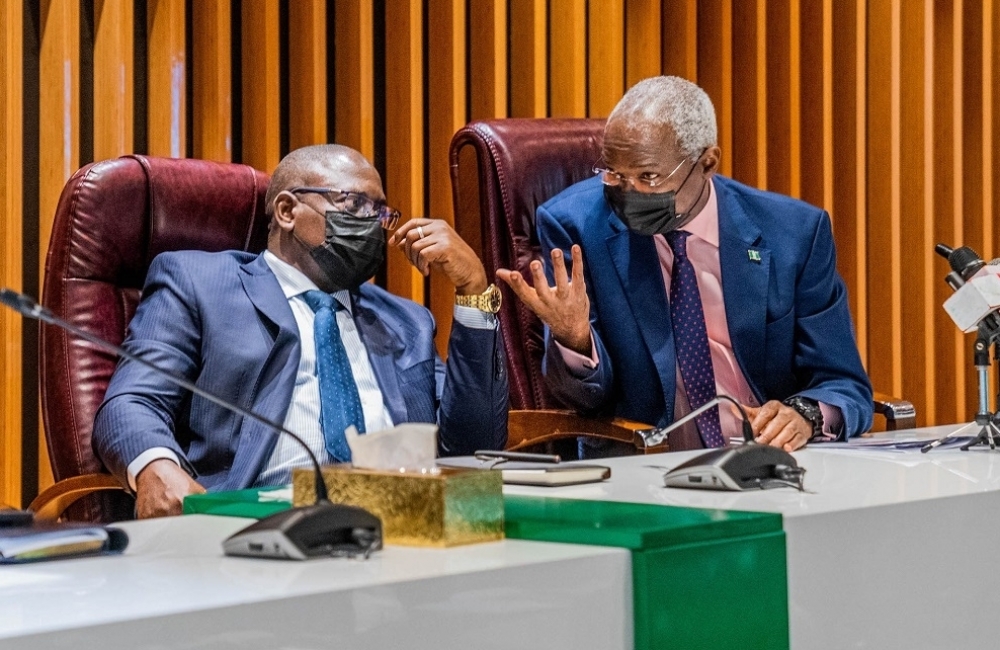
Implementation Of Phase Two Of NNPC-Funded Tax Credit Scheme On 44 Road Projects Nationwide Gains Momentum • As Fashola Convenes Stakeholders’ Meeting, unveil roads • Describes policy as a very defining legacy for President Buhari • NNPCL, FIRS other stakeholders pledge to sustain funding till completion • Contractors pledge timely delivery of quality road infrastructure • This Minister has set a record of achievements – NARTO President With appreciable progress being made in the first Phase, the implementation of the Nigerian National Petroleum Corporation Limited and Federal Inland Revenue Service (NNPCL/FIRS) Second Phase for the rehabilitation and construction of 44 critical roads across the country under the Tax Credit Scheme initiative of the Federal Government gained momentum Tuesday as the Minister of Works and Housing convened a meeting of the Stakeholders and briefed the press while also unveiling the roads. The Meeting came barely a fortnight after the approval of the Memorandum on the proposal by the NNPC and its subsidiaries, NNPC Exploration and Production (NEPL) and NNPC Gas Infrastructure Company Limited (NGIC) to undertake the rehabilitation of 44 roads spread across the six geopolitical zones of the country. The selected roads, amounting to 4,554.19 kilometres, include those in the South-South zone which are the Completion of Benin-Warri Dual Carriageway, Edo/Delta States; East-West Road, (Section I) Warri-Kaiama in Delta/Bayelsa States; East-West Road (Section II –I) Port Harcourt-Ahoada in Rivers State; East-West Road (Section II-II) Ahoada-Kaiama in Rivers/Bayelsa States and East-West Road (Section III) Onne Junction-Eket in Akwa Ibom State. Others are Dualization of East-West Road (Section IV) Eket-Oron also in Akwa Ibom; Upgrading of 15-kilometre Port Harcourt-Onne Junction (Section IIIA) in Rivers State; Construction of Eket Bypass (Dual Carriageway) in Akwa Ibom State; Dualization of Lokoja-Benin Road: Obajana Junction-Benin Section II Phase I: Okene-Auchi, Kogi/Edo States; Dualization of Lokoja-Benin Road: Obajana Junction-Benin Section III Phase I: Auchi-Ehor, Kogi/Edo States; Dualization of Lokoja-Benin Road: Obajana Junction-Benin Section IV Phase I: Ehor-Benin City; and Nembe-Brass Road in Bayelsa State. All the roads amount to a total of 1,308.3 kilometres. The North East Zone has a total of 1,054 kilometres consisting of Rehabilitation of Yola-Mubi-Maiduguri Road in Adamawa/Borno States; Rehabilitation of Maiduguri - Monguno Road; Rehabilitation of Numan-Jalingo Road in Taraba/Adamawa States; Rehabilitation of Yola-Hong-Mubi Road in Adamawa State; Reconstruction of Bali-Serti-(Gashaka)-Gembu Road in Taraba State; and Rehabilitation of Yashi - Deguri - Yalo Road in Bauchi State. North Central zone has 763.13 kilometres consisting of Rehabilitation of Minna-Zungeru-Tegina-Kontagora Road in Niger State, Section I: Minna-Tegina; Rehabilitation of Minna-Zungeru-Tegina-Kontagora Road in Niger State, Section II: Tegina-Kontagora; Shendam-Yelwa-Mato Junction-Taraba Border with Spurs in Plateau/Taraba States; Dualization of Suleija-Minna Road in Niger State: and Dualization of Lokoja-Benin Road: Obajana Junction-Benin Section I Phase I: Obajana-Okene, Kogi State. Others include the Reconstruction of the existing Pavement and Completion of the additional Pavement on the Dualisation of Abuja - Lokoja Highway Section Ill: Abaji - Koton Karfe Road in Abuja/ Kogi State; Construction of the Jarmai-Bashar-Zuruk-Andame-Karim Lamido Road in Plateau and Taraba States; Reconstruction and Expansion of Mararaba - Keffi Road in Nasarawa State. The North West Zone has a total of 980 Kilometres of roads being reconstructed consisting of Dualization of Zaria-Funtua-Gusau-Sokoto Road in Kaduna, Katsina, Zamfara and Sokoto States: Section I Zaria-Funtua-Gusau; Dualization of Zaria-Funtua-Gusau-Sokoto Road in Kaduna, Katsina, Zamfara and Sokoto States: Section II Gusau-Sokoto Road; Dualization of Zaria-Funtua-Gusau-Sokoto Road in Kaduna, Katsina, Zamfara and Sokoto States: Section II Gusau-Sokoto Road in Zamfara State; Dualization of Zaria-Funtua-Gusau-Sokoto Road in Kaduna, Katsina, Zamfara and Sokoto States: Section III Gusau-Sokoto Road in Zamfara and Sokoto States; Dualization and Construction of Kano-Kwanar Dauja-Hadejia Road in Kano/Jigawa States, Section I. Tsalle-Hadejia; Dualization and Construction of Kano-Kwanar Dauja-Hadejia Road in Kano/Jigawa States, Section II. Kano-Tsalle; and Rehabilitation of Kaduna-Pambeguwa-Jos Road in Kaduna/Plateau States. South East has 297.52 kilometres of roads consisting of Rehabilitation of Aba - Owerri Road NNPC Depot Expressway, Abia State; Rehabilitation of Otuocha - Anam- Nzam- Innoma-Iheaka- Ibaji Section of Otuocha - Ibaji-Odulu-Ajegwu in Anambra State; Construction of Ihiala-Orlu-Umuduru Road (Ihiala-Amaifeke Section) and Completion of Spur in Isseke Town-Amafuo-Uli in Imo/Anambra States. It also includes Rehabilitation of Old Enugu - Onitsha Road (Opi Junction - Ukehe Okpatu-Aboh Udi-Oji to Anambra Border) in Enugu State; Construction of Omor-Umulokpa Road in Anambra and Enugu States; Rehabilitation of Ozalla-Akpugo-Amagunze-Ihuokpara-Nkomoro-Isu-Onicha (Enugu-Onicha) with a Spur to Onunweke in Enugu State; and Rehabilitation of Old Enugu – Port Harcourt Road (Agbogugu-Abia Border Spur to Mmaku) in Enugu State. The South-West has a total of 150.56 Km of roads consisting of Rehabilitation and Expansion of Lagos-Badagry Expressway (Agbara Junction-Nigeria/Benin Border) in Lagos State; Dualization of Akure-Ita Ogbolu-Iju-Ado Ekiti State Road, Section I: Akure - Ita Ogbolu - Iju - Ekiti State Border in Ondo State; and Dualization of Akure-Ita Ogbolu-Iju-Ado Ekiti State Road, Section II: Ita Ogbolu - Iju – Ado-Ekiti in Ekiti State. In his remarks at the Meeting and Press Briefing, Fashola described the public private sector agreement as a very defining legacy for President Muhammadu Buhari pointing out that the impact of the “very innovative investment policy” would help Nigeria to really do business both locally and internationally being a sound infrastructure-based investment policy on which business is done. The Minister, who recalled that back in 2015 at the inception of the Buhari Administration, contractors were being owed two to three years’ payment arrears resulting in the shutdown of many project sites and laying off of construction workers by the companies, added that the Buhari administration arrested the situation by budgetary expansion from N18 billion for the whole of Nigeria’s road by the previous administration to N260 billion in 2016. “You were being owed”, the Minister reminded the contractors at the Meeting. “Some of the complaints that I heard at the first meetings that I had with many of you when I was first appointed Minister were that you were paid only 10 percent advance payment two or three years ago. That was how bad the construction industry was when we started”, he said adding that some of the roads were contracted back to “the private sector” to go and raise fund to finance them. Fashola, who also recalled that the roads contracted to the private sector, included the Lagos-Ibadan Expressway and the Second Niger Bridge, among others, added, “But where was the private sector going to raise hundreds of billions of Naira to fund them”. He explained that the Buhari administration had to utilize more practical funding initiatives like SUKUK. Recalling the controversies and criticisms that followed the borrowing option which the administration chose to fund the road and bridge projects, the Minister, who acknowledged the concern of the people over debt, however, added, that the debts “are buying roads, bridges, airports and seaports, assets that will last and sustain Nigeria’s development for the next 50 years”. He pointed out that the administration also met debt when it took power adding, however, that the difference between it and its predecessor was that the debts it met on assumption of office in 2015 had no assets attached to them while the Buhari administration invested its debts on infrastructure assets. He said the choices at the time were either borrow or increase taxation noting that without any of the choices, the economy would collapse. Faced with the choices, the Minister said, the administration took the borrowing option and also utilized an expansionist fiscal budget from N18 billion to N260 billion, adding that it thereafter supported the SUKUK and also went to recover some of the monies taken away from this country which today, according to him, “are building Abuja-Kano Highway, Lagos-Ibadan and the nearly completed 2ndNiger Bridge”. Giving a brief history of the NNPC/FIRS agreement, Fashola, who said that the NNPCL was investing its resources into infrastructure, explained the ideology of the Road Infrastructure Development and Refurbishment Investment Tax Credit Scheme as “a new model of partnership with the private sector companies whereby government is saying, “Give me my tax in advance and I will invest it in infrastructure”. “That model is why all of you are here”, he told the audience consisting of funding agencies and government representatives as well as contractors and newsmen adding that the innovation “shows the clear difference between two different government policies and it shows how they affect your businesses”. On the 44 roads, Fashola, who explained that many of them have been contracted but without funds to execute them, told the contractors, “This intervention, therefore, is to complete those roads and the NNPCL is providing the fund. And this is the crux; because it means that whether we are here, Buhari is here but is going in the next four months, there is sustainability in the completion of these roads. And they have assured me that when you work to specification, the money is there”. Noting that there are 21 roads in Phase One of the Scheme covering 1,804.6 kilometres, Fashola explained that there are other interventions by other groups like the Dangote Group, the NLNG Group in Bodo-Bonny, the MTN Group in Enugu-Onitsha Highway and others adding that this represented a very defining moment for the construction industry and allied industries. The Minister appealed to all the communities encroaching on the right-of-way along the road corridors to vacate the places adding that all the claims for compensation by people who have encroached on such right-of-way would not be honoured while they must quit the encroached places or risk forceful ejection. “Our right-of-way is 45.75 metres from both sides of the centre line. Many of the people who have built petrol stations and shops are inside our right-of-way. We will not pay compensation to those who have trespassed into our land, so they must leave”, he said appealing, however, that where the government needs right-of-way outside its zone, State governments, Village and Traditional Heads should appeal to their people to allow passage. Fashola added, “These roads are not taking away your lands rather they are bringing prosperity to you and we expect that in the process of nation building everyone must be ready to contribute something”. Highlighting the benefits of the revitalized construction industry to the economy, the Minister declared, “We have increased the number of quarrying companies, sand quarrying has also increased from 247 to 302. Granite quarrying companies have also increased from 334 to 655 and those who are quarrying laterite have increased from 108 to 259”. Describing quarrying as a driver of the construction industry, the Minister who said it is impossible to build roads without laterite and granite, added “And this translates to jobs as we build more quarries. I am sure members of NARTO and NURTW who are here can begin to calculate how many trucks trips and how much income that could bring. I was at their AGM recently and the least they could say is “Business is good”. This is the impact of a policy that is driving the economy”. The Minister also cautioned the Contractors against variation in the contract noting that the agreement was very specific on the variation. He declared, “So if you are going to ask for variation please opt out and say you cannot carry on with the programme. That is one of the reasons we are signing the agreement; and that is from the investors’ side because they are not factoring in variation”. He appealed to the financiers for timely payment of certificates for work done adding, “We need to improve the governance side of payment so that when receipts come, payments should not be delayed unnecessarily. Delayed payments increase the chances of variation. So, it is critical now that we also, with dispatch, sign the contracts when we are able, start the work so that we can process all the advance payments”. He urged the legal department of the Ministry to hasten the preparation of the documents so the agreement could be signed soon adding, “We have just finished our EMBER Months programme so this meeting is very strategic and we should handle it properly. The NNPC and FIRS are ready to go. So, I call on our legal department to accelerate the completion of this agreement. The Minister also warned the contractors, “Quality must not be compromised; they will have their own consultants. So, if their consultant queries the quality of your job, you don’t get paid. We don’t have the money; they have the money”. Those who spoke at the event included the Group Managing Director of NNPCL represented by the Chief Financial Officer, Mr. Umar Ajiya, the Chairman of the FIRS, Mr. Mohammed Nami, who all pledged to ensure the success of the Scheme, representatives of the contractors and President of NARTO, President of the NURTW who all hailed the Buhari administration and the Minister for driving the economy positively through massive investment in infrastructure. According to the NARTO President, “This Minister has set a record of achievements”. ...
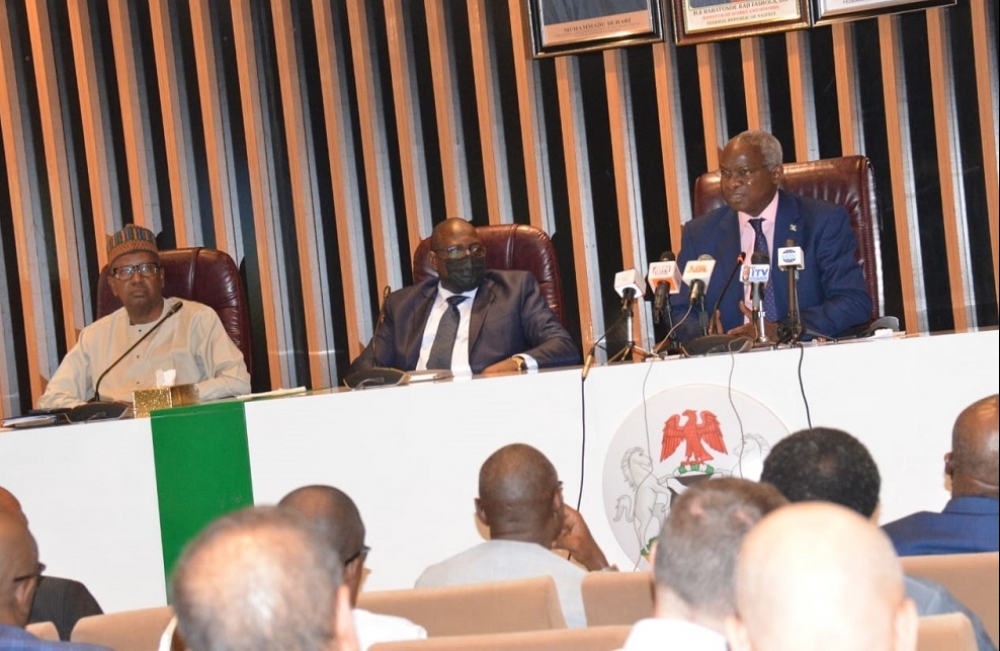
FG Commences Phase II of The NNPC Road Infrastructure Tax Credit Scheme … Intervention will ensure cash flow, steady projects completion - Fashola The Honourable Minister of Works and Housing, Babatunde Raji Fashola has stated that the Federal Executive Council has approved Phase II of the NNPC/ FIRS Road Infrastructure Tax Credit Scheme. The Minister said that the introduction of the NNPC Tax Credit Scheme will ensure the sustainability of funding critical infrastructure in Nigeria Fashola stated this at a press briefing in Abuja where all the stakeholders, including NNPC, FIRS and contractors were in attendance. The Minister noted that contrary to inadequate funding of infrastructure experienced under the past governments, the administration of President Muhammadu Buhari, has identified alternative sources of funding that could guarantee sustainability from the beginning of the projects to its completion without hitches Accordingly, he explained that the tax credit scheme is a new model that encourages partnership with private companies where taxes are paid in advance to enable the government invest in notable projects that would be beneficial to its citizens like what is going on in the road sectors of the economy. The Minister also mentioned that the Federal Government which has focused on nine major axis of Nigeria, explained that the A1 – A4 axis of the country covers the Northern part of the country, while the A5 - A9 axis covers the East-West zone of the country. He explained that the successful completion of all the roads would lead to sustainable mobility for Nigerians. The roads like Akure – Ado –Ekiti and East-West which people have been complaining about would be adequately catered for with the approval of the second phase of the NNPC Tax Credit Scheme. On payment of compensation, Fashola noted that compensation would not be paid to anyone occupying the government’s right-of-way, saying that the federal government right of way was 5.75 meters on both sides and appealed to members of the communities occupying it to vacate. Earlier, in his introductory remarks, the Permanent Secretary, represented by the Director Overseeing the Office of the Permanent Secretary, Engineer Folunsho Esan, recalled that in line with the Executive Order 7 (2019) approved phase 1 of NNPC/FIRS Road Infrastructure Tax Credit Scheme on the 27th of October 2021. He stated that with the completion of Phase 1, the Federal Executive Council (FEC) has also approved phase II of the scheme to fund 44 critical road infrastructures to the tune of N1.96 trillion naira. Speaking further, Esan said that as it was done with phase I, phase II would be governed by a set of guidelines to be issued to each contractor, adding that there would be a funding intervention agreement to be implemented in addition to the standard condition of the contract governing the execution of the projects. He said: “The availability of this new funding window will ensure steady cash flow and a timely completion of projects.” He also stated that the NNPC intervention which began in October 2021 with phase I has now occupied the top of the log with a portfolio well in excess of N2.6 trillion. On the part of NNPC, the Group Managing Director who was represented by the Chief Financial Officer of the Corporation, Umar Aliya said that funding would not be an issue anymore as the Corporation is committed to fully funding phase II. He said: “We are committed to setting aside funds for phase II. Funding would not be a problem. What is important to us is that our consultant will need to validate the value for money and the quality of work. We will not compromise the quality and timely completion of work. “ The NNPC MD further assured of the availability of fund, saying that “there is no need for excuses. As for us on our part, we are committed and we implore the contractors to do quality work and do it on time so that the road projects can be open for use to Nigerians,” On his part, the Executive Chairman of the Federal Inland Revenue Services, Mohammed Nami, he commended NNPC for the intervention as well as the contractors for the quality of the job done in phase I of the scheme and assured that the NNPC has the capacity to fund the phase II of the scheme. He explained that most of the roads captured by Executive Order 7 to be executed by NNPC were mostly road projects inherited by the administration of Muhammadu Buhari and they are being fixed by the present administration through the taxes paid by Nigerians “So, we are appealing to Nigerians to trust Executive order 007 so that government will continue to provide the physical infrastructure that our people need. “he said. The representative of the indigenous contractors, Isa Muhammed Gerawa, who spoke in the Hausa language, commended the administration of President Muhammadu Buhari for giving equal opportunity to local contractors to execute such contracts. He described the Minister of Works and Housing , Babatunde Fashola as a hardworking and committed Nigerian under whom many dilapidated Nigerian roads have been fixed and a number of single carriageway now dualized. Gerawa also commended the present government for raising the budget of the Works Ministry from N18bn in 2015 to over N200bn, pointing out that it was a clear commitment of the administration’s desire to fix the nation’s road infrastructure for development. ...
PUBLIC ANNOUNCEMENT
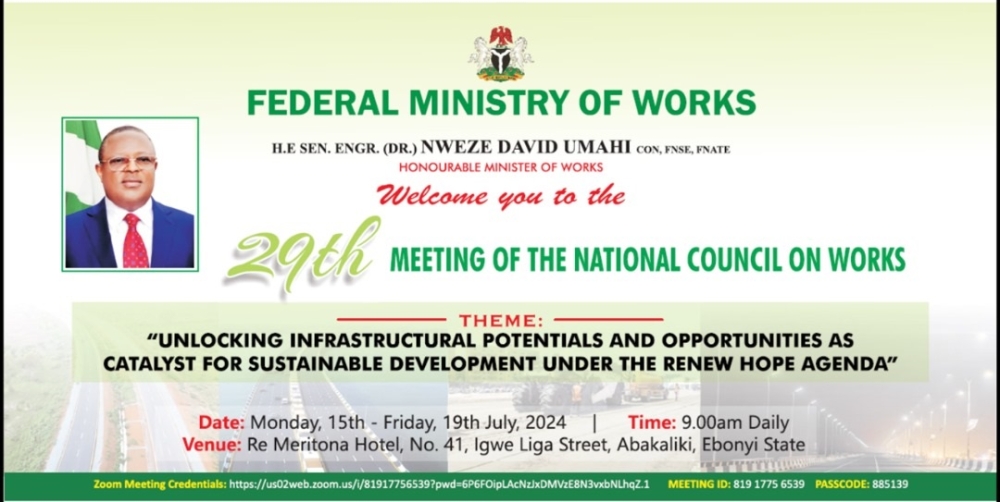
OTHER NEWS
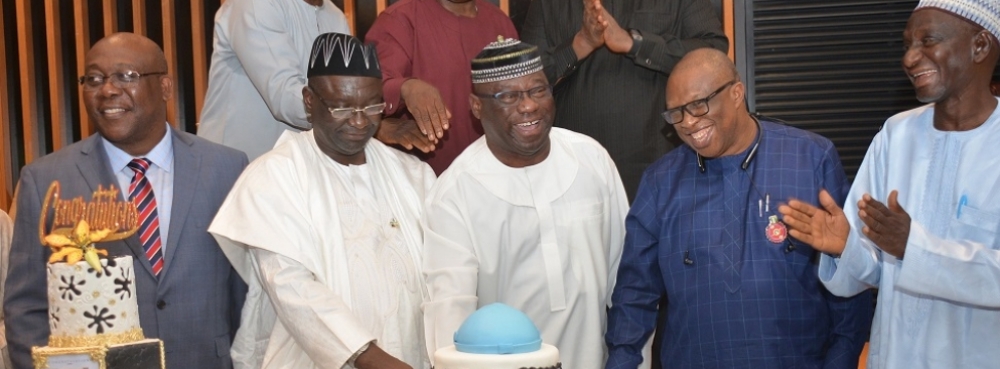
Two Senior Directors Retire From Works And Housing Ministry
Works and Housing’s Ministry Director of Highways (South East) , Engr Henry Okechukwu Udeh and Coordinating Director Bridge and Design , Engr Charles Obiora Okonmah had their joint retirement ceremony after 35 years in Federal Civil Service at the Ministry Conference’s Room yesterday.
The two retirees thanked God for preserving them while in office and also appreciated the staff of the Ministry for their cooperation and team work , they said without the cooperation from the staff , they wouldn’t have succeeded in their chosen endeavors.
Chairman of the event, the President of Council for the Regulation of Engineering in Nigeria (COREN) Engr. Ali Rabiu congratulated the two celebrants and said it was worthy of joy having served the country with good credentials in their individuals capacities professionally.
In his goodwill message, the Ministry’s Director Highways, Planning and Development, Engr. Chukwunwike Ogonna Uzo said that he was sure that they were retiring with happiness , as confidence and satisfaction could be seeing radiating from both of them , which showed that they were well prepared for the retirement and wish them good luck as they go further in life.
The Director Highways Design Road (North) in the Ministry Engr. Omotayo Awosanya while reading the citation of Engr Charles Obiora said “ He graduated from University of Benin and commenced work with the Ministry for 35years , during which he held top management positions . He is a COREN registered engineer, a member of the Nigerian Society of Engineers (NSE), Nigerian Institute of
Highways of Engineers (NIHTE), Nigeria Institute of Civil Engineers (NICE). While in the field, he was involved in the supervision of a host of large Highway construction projects.’’
The Citation of Engr. Henry Okechukwu Udeh was read by the Deputy Director Highways South East in the same ministry, Engr Clement Ogbuagu . He said “Engr Henry graduated in June 1983, with Bachelor of Engineering degree in Civil Engineering, he joined the Federal Civil Service in 1984. He was a Federal controller of works for the following states; Plateau, Kogi and Ogun State. He attended both local and international courses and conferences during his career in service.’’
In his remarks, while giving votes of thanks Deputy Director Highway (North Central ) Engr Bola Aganaba congratulated the retirees on their meritorious services rendered to the nation while in service.
Speeches

Keynote Speech Of The Honourable Minister Of Power, Works And Housing At The Guardian Power Summit
Keynote Speech At The Guardian Power Summit: "Beyond Rhetoric: Turning Nigeria's Power Sector Value Chain Potentials To Profit" Delivered By Babatunde Raji Fashola, San At Four Points, Lagos On Thursday 14th September 2017
I would like to start by thanking Lady Maiden Alex-Ibru, the chairman and publisher of the Guardian newspaper for inviting me to speak at this forum.
In particular, I have been invited as keynote speaker with the task of "setting the context" around the theme of turning Nigeria's power sector value chain potential to profit.
I welcome the opportunity this platform provides because it provides the Buhari led government a forum of expression to well-meaning and right-thinking persons who want to know what is going on about power.
As my invitation rightly acknowledges, context is important. It provides a rational basis for assessment and a fair determination for deciding whether progress is being made.
So, let us start by going back to May 29, 2015 when this government was inaugurated.
The amount of power available on the grid on that day was 2690 MW. The transmission capacity was around 5000 MW and was then infamously described as the weakest link.
The distribution capacity existing at around 750 33/KV trading points, from where power is received by the DisCos and sent to us, was about 4000 MW.
Clearly, the power then being generated at 2690 MW was not up to the transmission capacity of 5000 MW and was insufficient to fully optimize the distribution capacity of 4000 MW.
Within a few months after President Buhari’s assumption of office, power improved and we all acknowledged. We credited it to the President's ‘body language.’
But the truth was that it had little to do with body language, and more to do with a sense of purpose that people sat up and began to do what ought to be done.
In addition, the rains were upon us in July 2015 to September 2015.
There was Gas supply which allowed the Thermal plants to produce power.
Therefore from Hydro and Thermal sources we reached an all time peak power production of 5,074MW before the damage to the pipelines started and we started losing power.
We cannot damage power and gas assets and still expect them to provide service to us.
It does not make sense.
Instead of rhetoric, this government set to work.
a. Government engaged the aggrieved communities where the attacks were taking place to restore peace.
b. Government repaired the damaged gas pipelines and gradually restored gas supply.
c. Government launched an economic recovery and growth plan which made power supply one of 5 (FIVE) critical pillars.
d. Government launched a Power Sector Recovery Programme to work out and implement policies and actions such as:
i. Constituting the regulatory commission, the Nigerian Electricity Regulatory Commission (NERC); except the Chairman, now awaiting the confirmation of Senate and the Rural Electrification Agency (REA) to Champion solar power development and rural electricity deployment and access.
ii. Payment of debts to specific DisCos, and verification of debts to all others.
iii. Payment assurance guarantee scheme of N701 Billion to give confidence to GenCos, gas suppliers and their financiers that we mean business.
iv. Declaration of eligible customers, to encourage people to invest in building and expanding distribution assets.
v. Development of mini grid regulations to encourage individuals and communities to build their own mini power generation and distribution facilities.
vi. Awarding contracts to complete and expand transmission facilities and building new ones across the country.
Ladies and gentlemen, all of these policies and action go beyond rhetoric.
They are well thought out decisions, consistent with law and informed by a thorough diagnosis of the problems in the sector that have produced a clear set of solutions to deliver incremental power.
The result is that as at 4 September 2017 the available power that can be put on the grid was 6619 MW (the incremental power we sought to achieve from 2069 MW in 2015); the transmission capacity was simulated at 6,700 MW (up from 5,000 MW in 2015) but the distribution capacity was 4,600 MW which was what was put on the grid.
On September 12, 2017, production of power reached an all time level of 7,001 MW.
Clearly this is evidence-based progress, because we now produce more power then we can distribute. This does not mean that we have enough yet. It means that policies are working, but all the problems are not resolved.
We must continue the Power Sector Recovery Programme to impact the distribution end of the value chain so that we distribute and sell everything that we produce as an incentive to more power production and supply.
The recent GDP growth results by NBS, announcing Nigeria's exit from recession, and its detailed sector analysis, shows and I quote:
"Electricity production as well as financial services and construction also grew strongly..."
It went further to provide details by stating that:
"Other sectors the did very well in the second quarter 2017 include electricity and gas and financial institutions, with electricity and gas growing by 35.5%."
I acknowledge that there will be cynics who will say, it was because of the rains. True enough, the rains contributed to the Hydro power increase, but the total Hydro capacity available with the rains from Jebba, Kainji and Shiroro as of 4th of September 2017 was about 1,000 MW, so it is the gas thermal plants, arising from peace efforts and pipeline repairs that made up the difference that made the total available power of 6619 MW that was produced.
Therefore, beyond rhetoric, our next step is to solve the distribution problem.
This involves the sustained implementation of the Power Sector Recovery Programme.
Before I speak to the programme, let me say that although the power sector has been substantially privatized, and therefore it is the private sector that we must look to lead us through this. The sector is a regulated sector, governed by law, the Electric Power Sector Reform Act of 2005, and the regulations made by NERC (the Nigerian Electricity Regulatory Commission) which makes rules and regulations that govern the conduct of all participants in the value chain of power including TCN, the government owned company.
It is these rules and regulations that ensure confidence and predictability in the sector.
Therefore, one of the decisions under the Power Sector Recovery Programme is the enhancement of governance, like the constitution of NERC (that I have referred to), who have issued regulations to guide the development and deployment of mini grids of 100 KW -1 MW which will help distribution as they come on stream.
Another decision is to strengthen the governance of DisCos by reconstituting our board representation in all the discos, a process that is also underway.
Next is the implementation of eligible customers, which is awaiting the finalization of regulations by NERC based on consultations with stakeholders.
The successful implementation of this policy will help heavy power consumers, who are denied power because of defective distribution, to make the investment by building the distribution equipment under arrangements and agreements with the DisCos.
We are also looking at licensing some private power plants who have generation licenses and excess power, but no distribution license, to grant them permits to willing buyers especially in industrial clusters under regulations made by NERC.
Ladies and gentlemen, the Power Sector Recovery Programme also involves producing more power, like:
a. Completing the first phase of 9 (NINE) federal universities out of a planned 37 (THIRTY-SEVEN);
b. The completion of the 240 MW Afam power plant; the 10 MW Kasina wind farm, the 29 MW Dadin Kowa Hydro plant, 30 MW Gurara Hydro plant, the 40 MW Kashimbilla Hydro power plant, the Kaduna 215 MW plant, the Zungeru 700 MW Hydro plant and the Mambilla 3050 MW Hydro plant which was just approved for award;
c. Completing several transmission projects across the country; and
d. Implementing the meter supply and installation plan through licensing of service providers, franchise holders, rural communities meters to be implemented on the regulations by NERC this year.
My time constraints prevents me from going further into detail.
However, I believe that the much I have said reveals that this Government has undertaken a clear diagnosis of the problems, clearly understands them, has evolved solutions to address them, and some of them are already bearing fruit.
Successes so far recorded in power generation and transmission have revealed that the work is far from finished, but the capacity that achieved the success in generation and transmission can demonstrably be transferred to solve the distribution problems.
Finally, I believe that well-meaning and right-thinking Nigerians will agree, that the Buhari Government has gone way beyond rhetoric.
We have evolved solutions that are already contributing to GDP growth, and the promise to do more, unlock the power value chain potential for enterprise and profit clearly lies ahead of us, with the successful implementation of the Power Sector Recovery Programme.
Thank you for listening.
Babatunde Raji Fashola, SAN
Honourable Minister for Power, Works and Housing
Thursday 14th September 2017
PHOTO NEWS
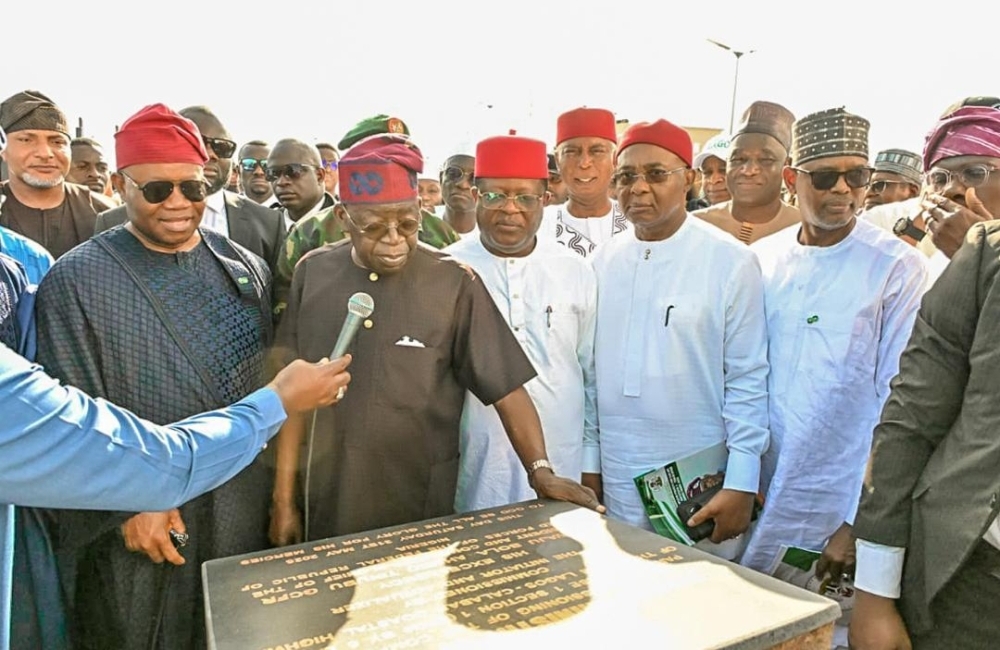
DRIVING NIGERIA’S FUTURE: CELEBRATING TWO YEARS OF TRANSFORMATIVE LEADERSHIP AND THE LAGOS-CALABAR COASTAL HIGHWAY MILESTONE
DRIVING NIGERIA’S FUTURE: CELEBRATING TWO YEARS OF TRANSFORMATIVE LEADERSHIP AND THE LAGOS-CALABAR COASTAL HIGHWAY MILESTONE
PHOTO NEWS
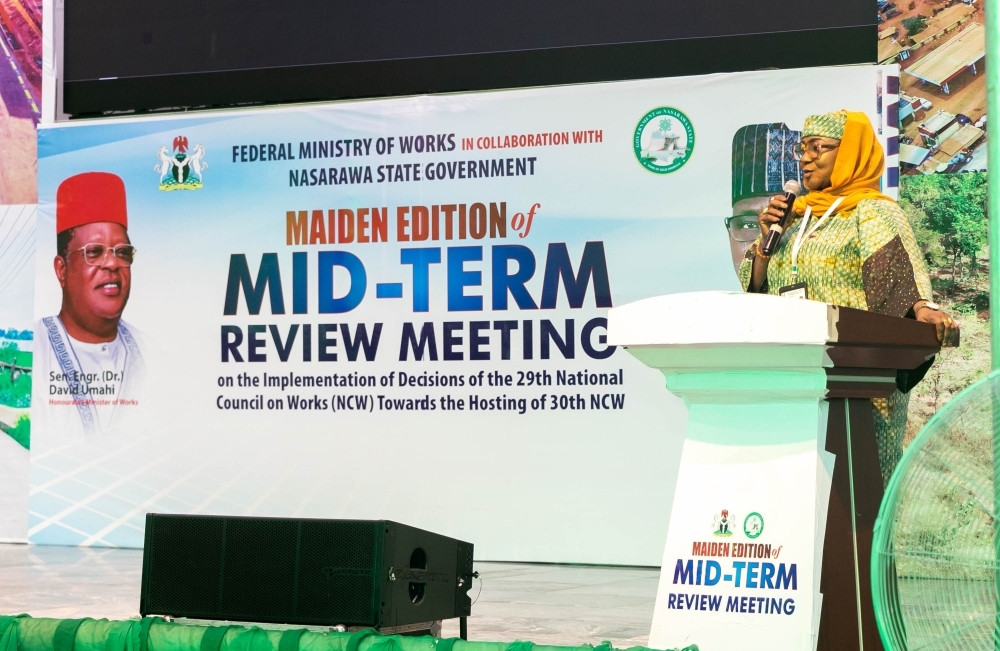
MID -TERM REVIEW MEETING ON THE IMPLIMENTATION OF THE DECISIONS REACHED AT THE 29TH NATIONAL COUNCIL ON WORKS (NCW) DAY 1
MID -TERM REVIEW MEETING ON THE IMPLIMENTATION OF THE DECISIONS REACHED AT THE 29TH NATIONAL COUNCIL ON WORKS (NCW) DAY 1










